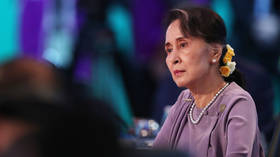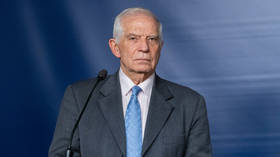Democracy icon goes on trial for election fraud

Aung San Suu Kyi, a former leader of Myanmar and Nobel Peace Prize laureate, is set to go on trial for influencing the 2020 election during the ballot to win a second term with her political party, the National League for Democracy (NLD). She will appear before a court in the capital Naypyidaw on February 14, according to a source close to the proceedings cited by Reuters.
Former Myanmar president Win Myint, as well as one of the former cabinet members Min Thu, are accused of the same fraud and face up to three years in jail if found guilty. According to Reuters, Aung San Suu Kyi herself has denied the ruling junta’s accusations of fraud.
Suu Kyi is facing charges in more than 10 legal cases, including incitement of public unrest, corruption, and breach of coronavirus restrictions. She has already been sentenced to a total of six years in prison, but the international community and her followers believe most of the accusations are politically motivated and designed to make sure she can never return to politics.
The military junta that currently controls Myanmar has issued no comment on the latest proceedings. The trials are strictly confidential, and Suu Kyi’s lawyers are subject to a non-disclosure order.
Aung San Suu Kyi was arrested before February 1, 2020 during a military coup when the junta seized power in the country after alleging voter fraud during the general elections. The coup triggered widespread demonstrations and protests, which led to more than 10,000 people being arrested and over 1,000 killed.
Aung San Suu Kyi, dubbed a ‘democracy icon’ by the media, was awarded the Nobel Peace Prize in 1991 for her work to bring democracy to Myanmar. In 2015, her political party won the election by a landslide, but she was prevented from becoming president due to regulations forbidding individuals with foreign children from occupying the post. Her reputation as a de facto ruler of the country was damaged in 2017 after her controversial treatment of the Rohingya crisis, when the government faced accusations of genocide.












